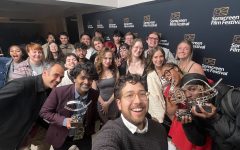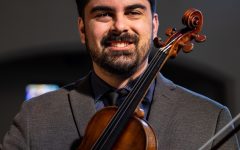#FacultyFriday: Meet Peter Katz
December 15, 2017 2018-02-23 13:20#FacultyFriday: Meet Peter Katz
For this week’s #FacultyFriday feature, meet Dr. Peter Katz, assistant professor of English. A PUC alumnus, Dr. Katz has taught at the college since 2015. Previously, he worked as a teaching assistant and teaching associate at Syracuse University in Syracuse, N.Y. While he was at Syracuse, he received several academic honors and grants, gave many campus talks, presented at several conferences. Dr. Katz is also a prolific author, and currently has two pieces under consideration at various publications, in addition to what he has already had published.
Name: Peter Katz
Title: Assistant professor of English
Email: pjkatz@puc.edu
Faculty since: 2015
Classes taught: English 101 and 102; Survey of British Literature; 18th Century Literature; Digital Rhetoric; History of the Book; Science and Culture; Society, Sentiment, Science; Approaches to Poetry
Education: Associate degree in music, from Pacific Union College, 2010; Bachelor’s degrees in literature and European history, from Pacific Union College, 2010; Ph. D. in English, from Syracuse University, 2015
Professional activities:
Reading Bodies: Associationism, Affect, and the Representation of Literary Scholarship in Victorian Fiction. Manuscript complete. Submission in progress.
“Redefining the Republic of Letters: The Literary Public and Mudie’s Circulating Library.” Journal of Victorian Culture, vol. 22, issue 3, 2017, pp. 399-417.
“Second Hand Politics: Sartorial Culture, Socialism, and the Work of the Novel in Walter Besant’s Children of Gibeon.” Political and Sartorial Styles. Ed. Kevin Morrison. Manchester UP. Publication in progress, 2017.
“The Moonstone,” and “The Woman in White.” Companion to Victorian Popular Fiction. Ed. Kevin Morrison. MacFarland. Submitted January 2017. Publication in progress, 2017.
“Staging the Streets: The Theatricality of Science in fin-de-siècle Martial Arts.” Victorian Literature and Culture vol. 44, issue 2, 2016, pp. 343-361.
What made you decide to be a teacher?
At the wise old age of 13, I had my first job: to teach three hours per week as an assistant instructor in a martial arts school. I imagine I was pretty terrible at it. By the time I left for college, I was teaching almost full time. I imagine I was still pretty terrible at it. But I quite enjoyed the look on people’s faces when they finally understood a concept, or finally nailed a difficult technique, or even just figured out how to tie their belt correctly. The joy and wonder a student experiences when he or she gets it for the first time—it’s contagious. The thrill of discovery makes me excited to talk about topic sentences for the thirtieth time, because it’s new for someone, and maybe, just maybe, for the first time, they’ll really get it.
Also, both of my parents and my sister are teachers, so it was kind of inevitable.
What are some of your hobbies?
Unsurprisingly, if you read the previous answer: martial arts. I have black belts in American Kenpo, Aikido, and Taekwondo, and teach American Kenpo at PUC. I also love skiing, and am a well-versed, if not proficient, video gamer.
What’s something people might be surprised to know about you?
That despite my musical training and performance of good taste, I secretly love awful pop-punk music like Panic!, Fall Out Boy, and Muse.
What’s your favorite thing about PUC?
Basically everything, but the people make it. Faculty, staff, students—they’re what brought me back here.
What’s your favorite spot on campus?
The Prayer Garden located at the end of the path near the Campus Center. My then-girlfriend-now-wife and I spent a lot of time there talking, reading, and occasionally painting (she painted; I made messes on canvases that even kindergarteners would disdain).
What’s your favorite book?
Wilkie Collins’s “The Moonstone” (1868) is my favorite novel. It’s hilarious, clever, complex, and most importantly to the average reader, deeply embedded in the vitalist/mechanist debates of the mid-century Associationst-physiologists.
What advice would you give to an incoming freshman?
Read. Read everything. Read your assignments pragmatically: it will make your classes most rewarding. Read your assignments deeply: you’ll be surprised when that book will pop up again in your life. Find rabbit-holes from your coursework and read everything about them. Read for fun.
Read the syllabus. I repeat: Read. The. Syllabus.
Interested in learning more about PUC’s English program? Visit puc.edu/admissions!






